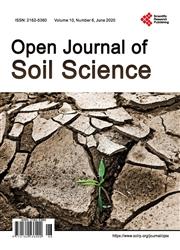Effect of Food Waste Compost (FWC) and its Non-Aerated Fermented Extract (NFCE) on Seeds Germination and Plant Growth
引用次数: 5
Abstract
The aim of this study was to investigate the effect of the food wastes compost (FWC) and its non-aerated fermented extract (NFCE) on seed germination and growth of tomato (Solanum lycopersicum L.), watercress (Nasturtium officinale), chili pepper (Capsicum annuum), peas (Pisum sativum L.), chickpea (Cicer arietinum) and beans (Vicia faba) under greenhouse conditions. The FWC and NFCE were physico-chemically and microbiologically characterized. The NFCE effect was evaluated on tomato, watercress, and chili pepper seeds germination and seedling growth. However, for leguminous, pea, chickpea and bean seedlings, the FWC amended soils and irrigated with NFCE were tested for plants growth. The results of FWC analyses revealed that FWC has neutral pH, low EC and C/N ratio, with fertilizing elements (N, P, K and Mg) and lack of phytotoxic effect. The NFCE was characterized by low EC and relatively high carbon content (COD = 9700 mg/l), and intense microbial activity, notably mesophilic bacteria. Therefore, in fermented compost extract, mesophilic bacteria were increased by 225, yeasts by 25 and molds by 10 times compared to those of the investigated compost. In greenhouse, the diluted NFCE increased significantly (p< 0.05) germination and growth of the tested seedlings. Used alone, the FWC amended soil or the NFCE irrigated soil, improved the growth of tested seedlings. The use of soil amended with compost and irrigated by fermented compost extract decreased significantly the growth of the same experimented seedlings. Therefore, the FWC and its fermented extract were a suitable substrate for germination and growth of the studied seeds.食物垃圾堆肥及其无气发酵提取物对种子萌发和植物生长的影响
本试验旨在研究在温室条件下,食物垃圾堆肥(FWC)及其无气发酵浸膏(NFCE)对番茄(Solanum lycopersicum L.)、豆瓣菜(Nasturtium officinale)、辣椒(Capsicum annuum)、豌豆(Pisum sativum L.)、鹰嘴豆(Cicer arietinum)和豆类(Vicia faba)种子萌发和生长的影响。FWC和NFCE进行了理化和微生物学表征。评价了NFCE对番茄、豆瓣菜和辣椒种子萌发和幼苗生长的影响。然而,对豆科、豌豆、鹰嘴豆和豆类幼苗进行了FWC改良土壤和NFCE灌溉的植物生长试验。FWC分析结果表明,FWC具有中性pH,低EC和低C/N,有N、P、K、Mg等施肥元素,没有植物毒性作用。NFCE具有低EC和较高碳含量(COD = 9700 mg/l)和强烈的微生物活性(以中温细菌为主)的特点。因此,与所研究的堆肥相比,发酵堆肥提取物中嗜酸性细菌增加225倍,酵母增加25倍,霉菌增加10倍。在温室中,稀释后的NFCE显著提高了幼苗的发芽率和生长(p< 0.05)。单独使用,FWC改良土壤或NFCE灌溉土壤,改善了被试幼苗的生长。施用堆肥改良土壤和发酵堆肥浸出物灌溉对同一试验幼苗的生长有显著的抑制作用。因此,FWC及其发酵提取物是适宜种子萌发和生长的基质。
本文章由计算机程序翻译,如有差异,请以英文原文为准。
求助全文
约1分钟内获得全文
求助全文

 求助内容:
求助内容: 应助结果提醒方式:
应助结果提醒方式:


